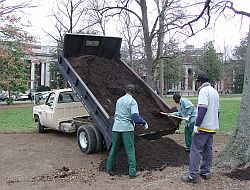Vanderbilt discovers the ‘black gold’ of composting
[Originally published in MyVU]
 Vanderbilt’s park-like setting that garnered it the designation of a national arboretum also means a lot of trees: more than 7,500. And all those trees produce a massive amount of leaves that, until recently, were just stockpiled at Natchez Triangle.
Vanderbilt’s park-like setting that garnered it the designation of a national arboretum also means a lot of trees: more than 7,500. And all those trees produce a massive amount of leaves that, until recently, were just stockpiled at Natchez Triangle.
“The Grounds Department wanted to try to incorporate green principles to compost the leaves for our own use on the grounds,” said Judson Newbern, associate vice chancellor of campus planning and construction. “But we’d been unsuccessful at transforming the massive pile of leaves into usable compost.”
Working together with Students Promoting Environmental Awareness and Recycling (SPEAR), Vanderbilt hired Marcus Kerske, who with his family, operates Nashville’s Gardens of Babylon, a nursery/landscaping center based on sustainable practices.
Kerske outlined an approach that included a field trip to Metro’s county-wide composting operation successfully overseen by Public Works and a part of its Educational Outreach program coordinated by Julie Berbiglia. He also collaborated with Bill Randles, turf specialist, and Danny McKissack, grounds foreman, at Vanderbilt to set a schedule of tasks to apply to the leaves to hasten their decay into rich organic matter.
“Our biggest challenge was getting enough oxygen into the leaves to allow the right decomposition to happen,” said Kerske. The enormous, single pile of leaves was reconfigured into a 90-foot row about 7 feet high. This arrangement allowed the Operations staff to turn the pile with a front-end loader to expose all layers to oxygen.
The beautiful results were recently witnessed when the first batch of rich, dark compost was loaded into trucks and returned across campus to be spread under the trees that shed those leaves several seasons ago.
“Compost helps rejuvenate plants and trees in urban settings due to the richness of the microorganisms in it,” explained Kerske. “This is the first step towards rebuilding the soil structure in these beds.”
The insulating layer of compost will also be helpful if drought conditions are experienced again like the summer of 2007.
“The bigger concept each autumn will be to shred some leaves finely enough to fertilize our lawns without shading out the grass; to shred some onto bed areas under trees; and to haul enough leaves to the Natchez Trace composting operation to keep the cycle going to renew the vigor of our campus soil for future generations,” said Newbern. “That’s our plan for working smart and staying in balance with Nature.”

Leave a Response